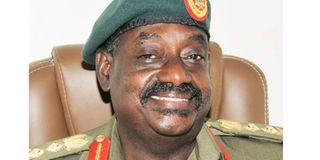Gen Sejusa, you owe my people an apology

Gen Sejusa. He oversaw counterinsurgency operations in the north.
What you need to know:
Stories abound of how Sejusa personally caned some politicians from northern Uganda from his work base in Lira District.
When David Sejusa fled into exile in May this year, he made public his opposition against President Museveni and his government. He continues to release details of failings of the regime he has been part of for the past 27 years.
While launching the Freedom and Unity Front (FUF) party in London School of Economics last week, Gen Sejusa brought to the fore a number of issues, including a revelation that the 2006 presidential election was won by FDC’s Kizza Besigye and not President Museveni.
Gen Sejusa details how the election theft was done: “We organised another electoral commission of Intelligence at Basiima House [near Mengo, a Kampala suburb] and all results from the electoral commission would pass through our electoral commission and it is our results that we would push through to the [official] Electoral Commission.”
Sejusa says FUF comes with a mission to fight dictatorship and for people to set themselves free. The beginning of this freedom, Sejusa says, “starts by me admitting I am wrong and say I am sorry”.
Why is he sorry?
But what is Sejusa sorry for? What is the name of that crime he committed? And why doesn’t he state it? Why is Sejusa apologising for nothing?
Tinyefuza, Sejusa’s ‘former’ name is well-known and dreaded in northern Uganda.
Sejusa supervised counter-insurgency operations in northern Uganda between 1990 and 1991, during which flagrant human rights violations were committed. Scores of people are believed to have been tortured and killed during the cordon-and-search operations under Operation North.
Stories abound of how Sejusa personally caned some politicians from northern Uganda from his work base in Lira District.
The General is also said to have ordered the caning of soldiers deployed to boot out Lord’s Resistance Army rebels from Kitgum District. The soldiers are said to have fallen into a rebel ambush. And for those who survived, Sejusa allegedly ordered that the soldiers be caned until he gives another order stopping the assault.
In an interview with this newspaper in September, exiled UPDF renegade Colonel Samson Mande said when defeated UNLA soldiers showed interest in surrendering and joining the National Resistance Army, which had taken over power, he informed Gen Sejusa about the issue at hand. However, Sejusa reportedly told Col Mande to “stop treating the Acholi with kids’ gloves”. And according to Mande, “That meant I should have molested them…” This was in early days of NRM/O’s ascent to power.
Missing details?
In his London speech recently, Sejusa states that “People in the north died. They did…How many, and by who, is a matter of detail”.
But when shall we get this detail? Why is this detail conveniently omitted at a time when Sejusa wants us to believe he has untied the knot with a bad system?
Sejusa stated that he was the first to make noise over the atrocities in the north and subsequently resigned over it in 1996. And for that matter, ‘If all that meant I was guilty, I would not have resigned”.
He says he is ‘a new man’ now and that Uganda must look its problems in the eye and confront them for national healing to take place.
For a start, how about Sejusa makes an elaborate explanation of his [mis]deeds in northern Uganda? Whether he will tell us the truth is another matter. But the Acholi, the Langi and Ugandans at large need an explanation -- and above all an apology.
The healing that Sejusa is talking about cannot happen just because he is exposing the rot in a regime he has been part of. Healing cannot happen if we wear white cloaks and ignore the dirt on our bodies.
Must we forgive because Sejusa says he was a victim of this regime? Must we forget because Sejusa comes with a promise of undoing the wrongs of the past? Are we not entitled to know what these wrongs were in the first place?
If Gen Sejusa has indeed ‘seen the light’, let him demonstrate that he has. Otherwise, it will be very easy to believe that the reason for all this verbal stone-throwing is to gain political approval and not for accountability or remorsefulness.
In 1991 when Sejusa was steering counterinsurgency operations in the north, I was in kindergarten in Gulu - my home district, but I grew up hearing these chilling stories about him. The stories are still being told today even when Sejusa has declared interest in ‘righting’ Uganda. Did I grow up listening to concocted stories or is there truth to them?
To err indeed is human.
But when we recognise our inherent weaknesses, we must be bold enough to strip ourselves of these errors and get new clothing to cover our nakedness.




